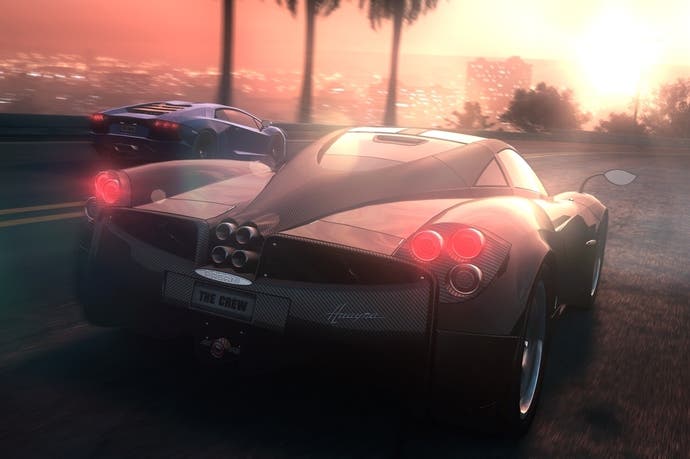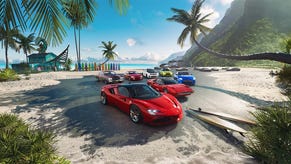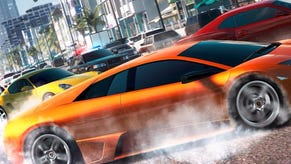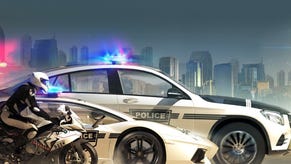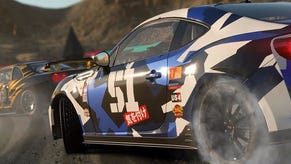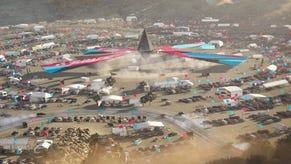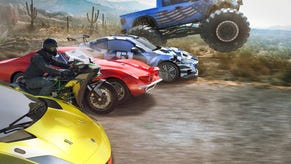The Crew levels up the CarPG
Grinding gears in Ubisoft's open-road MMO.
"At E3, people forbid me to say 'MMO'. The marketing teams were like, 'Don't say that. Don't say that.' It's crazy." Julian Gerighty is a former marketer himself, who worked his way up to a senior position in IP development at Ubisoft's Paris headquarters before jumping (or possibly parachuting) into development. Now he's a creative director at Lyon studio Ivory Tower and the well-spoken and enthusiastic spokesman for its ambitious online driving game, The Crew. He seems to enjoying himself on the other side of the fence.
The Crew struggled to stand out at E3; in presentations it looked like any other racing game, while a brief demo of a co-op "raid" in which a team of players smashed up an enemy car didn't really sell the concept, feeling like a driving mission lifted from a mediocre open-world action game. Now Ivory Tower is presenting The Crew on its own terms, inviting press to play a full build of the game for a few hours at an intimate event in Paris' fashionably scruffy 11th arrondissement. Those terms include calling a spade a spade, apparently. "It's an MMO," says Gerighty flatly. "It's an RPG."
He's right. You need to spend some time with The Crew, cruising across its scaled-down but still vast map of the continental USA, to understand what makes it different from a Need for Speed or even a more refined open-world driving game like Forza Horizon. In the cheeseball storyline and smoking-tyre handling there's a bit of Reflections' excellent Driver: San Francisco present - but only a bit. (Reflections is helping with some design and production for The Crew, and making the PS4 version.) Naturally, Test Drive Unlimited is the closest comparison, because Ivory Tower was founded by staff from its developer Eden Games who wanted to further that game's concepts but didn't want to work on the sequel for Atari. Yet even that doesn't quite cover it.
Test Drive Unlimited was a trailblazing driving game that invited players to collect and race luxury sportscars on an amazing, to-scale recreation of the Hawaiian island of Oahu. You could also indulge in the lifestyle of the rich and idle, buying apartments and fashions to show off to friends as well as the strangers the game would randomly connect you with. The networking and car handling were rough and the aspirational lifestyle stuff was stiff and forced, yet it was still a compelling fantasy made more powerful by its connectedness, and it retained a passionate community. "A lot of people played Test Drive Unlimited and loved Test Drive Unlimited because it was an MMO. I mean, there's no escaping that," reckons Gerighty.
What it wasn't was a role-playing game (despite inviting you to role-play as an awful Eurotrash playboy). It had a simple version of the "CarRPG" progression offered by Gran Turismo and its ilk: you grind out cash to buy cars, upgrading them as you go, but principally collecting them. Sometimes these games feature experience points and sometimes they don't, but either way they offer a rather abstract, removed form of meta-advancement. It's not the tangible, mathematical progression you feel in an RPG as your character cuts a swathe through a forest of numbers, reaping loot and advancing stats as you go, hitting harder after every quest.
The Crew has this. In fact, it nails it, better than any driving game has previously. The key to it is the way it ties progress to individual cars, which have their own levels. Cars can also be specialised, like RPG classes, in six different specs: stock, street racing, dirt racing, high performance, raid (a tough off-road spec based on the Paris-Dakar rally raid) and full-on circuit racing. "[In our playtests] people, instead of trying to have a huge garage of all of the different cars, would focus on one or two cars and try and make them evolve as much as possible and get those evolutions to the highest level possible," Gerighty says. "[Collecting is] part and parcel of everybody's personality when they're in front of a driving game... but it's not the way we've seen people play this game. Which is cool."
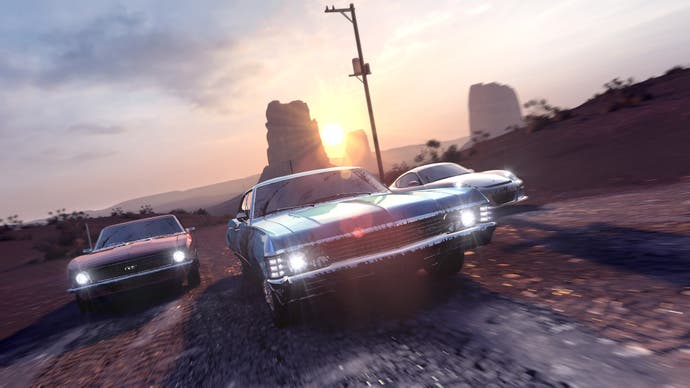
In your HQ - a base you establish in each of the game's four major cities, Detroit, New York, Miami and Los Angeles - you can strip your car down to its drivetrain and chassis as you modify it and watch the components working under the physics model. But this isn't a game about changing the physical properties of your car's handling the way Forza or GT is. It's about improving it in increments, powering up its stats with parts that operate more like a new sword or breastplate in an RPG. And true to form, you don't buy these parts from a shop - you earn them out in the world. Parts are offered like quest rewards for events scattered around the map: races, time trials, raids and so on, some of them advancing the storyline. You also get parts, currency and experience for skill challenges - and these unassuming but brilliant driving tests are the glue that holds The Crew together.
Skill challenges take less than a minute and task you with maintaining high speed in traffic or slaloming through gates, say. They're seeded densely across the entire map and just driving through one triggers it automatically - you don't have to enter a menu or even lift off the gas. They're a lot of fun, especially as you have to thread most of them together through civilian traffic, and every one has a chance of dropping a part that will upgrade your car. A long cross-country drive becomes a seamless string of driving challenges that you won't want to end. My guide, producer Ahmed Boukhelifa - one of the original refugees from Eden - refers to how he likes to head out into the map and just "grind Skills" to level his car up, like grinding monsters in an RPG. That's exactly how it feels - in a good way.
On his last testing session, Boukhelifa tells me, he didn't even do that; he just set out for a long-distance cruise across the map, exploring, enjoying the drive. Although events and skills are organised in level bands with a definite path to follow, guided by the storyline, geographically the whole game is unlocked from the start - so there's nothing to stop you heading for California at the beginning just for the hell of it. The scenery and the sheer expanse of it are reward enough, and you'll unlock a fast-travel public transport network as you go - but as in TDU, it's more fun to drive yourself. It took me 20-30 minutes to get from New York to Miami, and a coast-to-coast trip apparently takes up to 90 minutes. Most cities are rendered in miniature, but the four prime cities are on a more typical open-world-game scale. This is a big map.
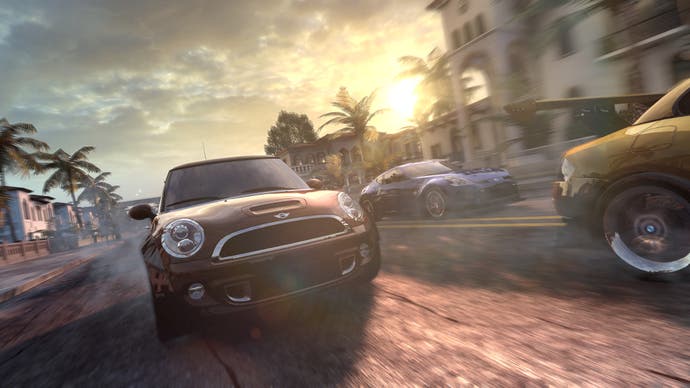
The game itself isn't quite as huge as that map suggests, but it's not far off. A full run of the story will clock in at around 20 hours, Gerighty says, and is capped by an endgame that will fill another 20 hours - and that's just maxing out a minimum handful of cars. From a few glimpses, the corny tale of underworld something-or-other struggles to provide a meaningful context for the racing. Gerighty defends it - to a point. "I'm maybe one of the only people, but I know I'm not, who really enjoyed the silly narratives that Need for Speed had when Black Box was doing it," he says. "I think the narrative actually brings a lot of structure that helps drive people around the country - even though we're considering the narrative to be basically the tutorial for the endgame stuff." And what is the endgame stuff? The entire game again: every event and every skill challenge across the map, redone as a 'platinum' award for level 50 cars.
Despite Gerighty's frank line, it's as an MMO that The Crew doesn't quite convince. Like Bungie's Destiny, it's not a true persistent online world that lives on a server, but it has a clever way of connecting multiple eight-player peer-to-peer games in a wider network; it's the "second or third" iteration of Test Drive Unlimited's system. "Basically there's a bubble that's created around you and you're a moving server, if you will. So if you're driving from the west coast to the east coast, you'll completely refresh that bubble and you'll see different players around you... seven other players at all times. So if you're bombing it down a motorway, those seven players will be refreshed constantly. It always gives priority, though, to your friends."
What makes The Crew unique is the way it hooks exploration, advancement and the car you're driving together, creating a moreish feedback loop of free-wheeling progression
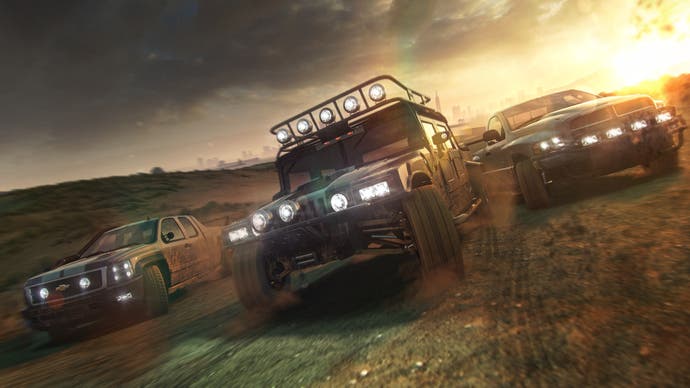
The pleasures of this connected set-up are obvious, as I discover when I set out on an aimless cruise across Louisiana with Boukhelifa, tailing each other as we chain skill challenges. It will bring the world to life to see other players drive past, and the default option for every event will be to invite nearby players to enter it in "co-op" (the term is used even if you're participating in a race, since the goal will be to defeat AI drivers). Of course, there's also fully competitive racing, which Ivory Tower dubs "PVP" in true MMO style. But The Crew lacks TDU's option to engage passing players in on-the-spot challenges with a flash of your headlights, and on current evidence there's no unique multiplayer content that fully justifies that internet connection requirement. It's mostly a mood thing: the extra frisson you get from seeing other players out in the wild, racing alongside you.
That adds flavour and gives the game community-building potential - something many mainstream racing games lack. But what makes The Crew truly unique is the way it hooks exploration, advancement and the car you're driving together, creating a moreish feedback loop of free-wheeling progression. It's intoxicating stuff, but it's difficult to understand its power without playing it, while the game's outward personality is bland and confused; a mishmash of brash customisations and sleek licensed cars, cheerful colours and grainy filters, it lacks a coherent visual identity. Gerighty's friends in marketing have a tough job to do, no doubt. Here's hoping they succeed, because while The Crew may still be struggling to define an identity, it's certainly got a soul.
This article is based on a press trip to Paris. Ubisoft paid for travel and accommodation.
